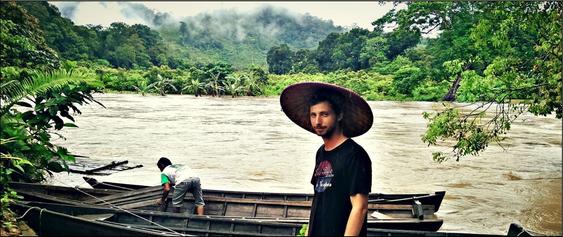By Will McCarry
September 29, 2021
Meet a scientist: To adapt to climate change, this expert looks to nature
6 min

By Will McCarry
September 29, 2021
6 min
As a kid growing up in the Swiss Alps, Giacomo Fedele loved climbing trees and exploring forests. He turned his love of nature into a globe-trotting career as Conservation International's climate change adaptation expert — working with and learning from communities around the world that are most impacted by global warming.
Conservation News spoke with Fedele about his unlikely path to becoming a scientist, the ways in which communities — from Madagascar to Mexico — are adapting to rising temperatures on their own terms and how he manages to stay optimistic despite an uncertain climate future.
Question: What led you to a career studying nature?
Answer: I’ve been passionate about nature ever since I was a kid. Growing up in the Swiss Alps, I spent a lot of time hiking in the wilderness, hunting mushrooms and climbing trees. I’ve always been curious about the diversity of nature and all the ecosystems around me, which is what led me to study environmental science at university.
During my master’s thesis, I traveled to remote communities in Madagascar, where I began to discover a new dimension to the natural world. I saw local people using nature to meet many of their daily needs — from producing medicine to foraging for wild foods when their crops failed to building their homes. This idea of people’s reliance on nature soon became a focal point of my research. At Conservation International, my work looks at the ways nature can help people adapt during this climate emergency.
Q: What kind of research are you doing now?
A: My work focuses on the intersection of nature and climate — or how nature can help people adapt to climate change and reduce its overall effect.
For me, it's really about bringing nature into the conversation as a climate change solution, which isn’t always as obvious as people think. Climate change is often seen as an issue that can be solved by curbing big carbon emissions from the energy and transportation sectors or using technologies to help us address these challenges. And while this is true, conserving ecosystems — which absorb carbon — is an essential part of the solution, especially in developing countries where many people rely on nature for their livelihoods. In many cases, the communities that are closest to nature have their own strategies for protecting it and adapting to the impacts of climate breakdown.
Q: Can you give an example?
A: I’ll always remember my experience visiting the coffee farmers we work with in Oaxaca, Mexico. Due to climate change, the land is becoming drier, hotter and less suitable for coffee, so the farmers have had to shift the way they cultivate this crop. This can mean farming different beans that are more heat-tolerant, mixing coffee plants with other tree species for shade, moving their farms to higher altitudes or even changing crops entirely.
It was extraordinary to see their adaptability. These farming communities aren’t just waiting for governments or advocacy groups to bring solutions — they are really taking matters into their own hands. This initiative emphasizes that one of the best things we can do to tackle climate change is listen to the communities that are already working to fight it — and find ways to support them.
Q: Working on climate change must be disheartening at times. How do you stay optimistic?
A: This is a question we’re all asking ourselves — especially after a year in which the world has experienced devastating droughts, floods, wildfires and, of course, an ongoing global pandemic. I get the most energy from being part of a community of equally passionate people, both within and outside of Conservation International.
The climate crisis is an issue that is touching everybody’s lives. Even in the most remote places, people are seeing its effects and finding their own ways to adapt, which I find very motivating. It shows that we’re all in it together. Everyone should be and can be part of the solution — and communities around the world can unite and move toward a much more powerful and inclusive approach to this issue. That gives me a lot of energy.
Q: What advice you would give someone who wants to follow in your footsteps?
A: Environmental science encompasses such a wide variety of topics, so it’s important to really find your niche. This is just another way of saying that you have to discover exactly what you’re passionate about, which takes curiosity, the ability to embrace different types of knowledge and, most of all, being open to learning new things.
Building a diverse network is also crucial in this field. Early on in my career, I found myself connecting to like-minded people, including mentors and supervisors who encouraged and challenged me in important ways. By the time I started my doctoral degree, I had a much clearer picture of what I wanted to do, which was informed by the opinions of those I trusted and admired the most.
Will McCarry is a staff writer at Conservation International. Want to read more stories like this? Sign up for email updates. Donate to Conservation International.
Cover image: Cows (© YRShots/Pixabay)
Further reading:
Join our community
Hear from scientists and changemakers, step into stories of experts in the field, and come closer to the awe-inspiring power of nature. By subscribing, you agree to our terms of use.